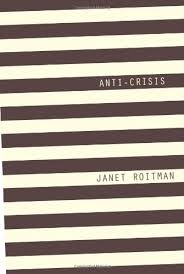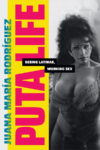 “We are approaching a state of crisis and a century of revolutions.” So wrote Jean-Jacques Rousseau in Emile, cinching his reputation for a generation of scholars as the spiritual father of the French Revolution. “One day my name will be connected with the recollection of something enormous — with a crisis such as never before existed on Earth, with the deepest clash of conscience, with a decision solely invoked against all that had until then been believed, demanded, hallowed.” So wrote Friedrich Nietzsche with characteristic immodesty, anointing himself as spokesman of modernity. “Thus the crisis of philosophy implies the crisis of all modern sciences as members of the philosophical universe: at first a latent, then a more and more prominent crisis of European humanity itself in respect to the total meaningfulness of its cultural life, its total “Existenz.” So Edmund Husserl ominously wrote in 1936, in his great unfinished work The Crisis of the European Sciences.
“We are approaching a state of crisis and a century of revolutions.” So wrote Jean-Jacques Rousseau in Emile, cinching his reputation for a generation of scholars as the spiritual father of the French Revolution. “One day my name will be connected with the recollection of something enormous — with a crisis such as never before existed on Earth, with the deepest clash of conscience, with a decision solely invoked against all that had until then been believed, demanded, hallowed.” So wrote Friedrich Nietzsche with characteristic immodesty, anointing himself as spokesman of modernity. “Thus the crisis of philosophy implies the crisis of all modern sciences as members of the philosophical universe: at first a latent, then a more and more prominent crisis of European humanity itself in respect to the total meaningfulness of its cultural life, its total “Existenz.” So Edmund Husserl ominously wrote in 1936, in his great unfinished work The Crisis of the European Sciences.
Crisis is not a small word. It is meant to raise the stakes of the present moment. We may no longer speak with the grandeur of the Continental philosopher (Rahm Emanuel parroting Winston Churchill — “never let a good crisis go to waste” — is probably the best known use of the term today), but that doesn’t take any of the immediacy out of the crisis claim. However, what are the grounds of crisis? What allows us to call the 2007-9 economic collapse the “Global Financial Crisis,” and how do we tell ourselves the story of how we got there and where we need to go? As the anthropologist Janet Roitman notes in her excellent new book Anti-Crisis, our telling of events like the Global Financial Crisis has the effect of “permitting and enabling certain narrations and giving rise to certain questions, but not others.” The questions we tend to ask are along the lines of “what went wrong?” (e.g. in our pricing of derivatives or other complex financial instruments), but not “how can one know crisis in history? And how can one know crisis itself?” It is a stretch to say that the Global Financial Crisis has reached any neat resolution, which makes Roitman’s call to think outside of the politics of crisis such an important task for understanding our present moment — in both its limitations and possibilities.
I sat down with Janet on a chilly morning near Lincoln Center to discuss why we need to think crisis differently, why the concept has eluded the critical attention that we give to other terms, and why anthropologists may have something significant to contribute to philosophy and political theory.
Michael Schapira: How did you arrive at the concept of “crisis?”
Janet Roitman: It’s actually a very simple story. I’d published my first book, which was on Central Africa and related to economic anthropology. One of the things that was important to me in that book was to not write about Africa and its pathology. I was very careful not to take the Weberian model of the rational-legal state and then recount the ways that Africa diverges from and doesn’t achieve that model — which is basically what most political science on Africa does. I was teaching in France at the time and got an email from Beth Povinelli at Columbia inviting me to give the Franz Boas lecture. Of course, I was very flattered. So we had this email exchange. Fiscal Disobedience had been out for a couple of years and I didn’t want to just present the book, so I wondered what exactly they wanted me to do. She wrote back saying that the book had been really helpful for thinking about crisis in anthropology. I didn’t know if she meant crisis in the discipline of anthropology or how anthropologists deal with the concept of crisis, but what I did know is that I felt I had failed miserably. In the introduction to my first book, I say why I am not using the terms crisis or failed states, so I thought, “Oh no, I went to all these pains to avoid these terms and here they are asking me to come talk about them.” I was really flummoxed, but I thought about it and realized that Achille Mbembe and I had written this text almost a decade prior in Public Culture called “Figures of the Subject in Times of Crisis.” So I went back and reread that text and realized that I was happy when we wrote it, but now totally disagreed with it a decade later. So I wrote the presentation for the Franz Boas lecture that explained why I was in disagreement with it and why my book was supposed to have marked a different direction.
To jump over a lot of stuff, I ended this experience of having given the lecture with the question of how to think Africa otherwise than under the sign of crisis, which was a quandary. As an anthropologist, or at least someone associated with the discipline of anthropology, I had to devise an ethnographic project to investigate this question; but first I really needed to think more about the concept. So I started this work of inquiring into the concept. When I arrived at The New School in 2007, I taught two graduate seminars where we really traced the emergence of the concept in the social sciences and its displacements through various disciplines — from Marxist historiography to economic anthropology to post-structuralism, etc.
I can see how the concept emerges from a strain within your own work, but at the same time is the world also pressing in upon you, because this must have been happening during the “Global Financial Crisis?”
That’s exactly right. When I was in France I was working very closely with Michel Callon, who was studying the economic. When 2007 — lest I say financial crisis — or subprime happened, he told me “You really have to work on this.” There was all of this narrative that was being produced, so that was the moment to see how the concept of crisis was working. So what started as a reflection for fieldwork or elaborating a fieldwork project — just working through and thinking about this ethnographic project — ended up as a book, which was not my intention. In the beginning, I thought I would publish maybe one article on subprime, but as I read all these texts that were written about the financial crisis, of which there were many, it ended up expanding into a book.
Have you gotten good at explaining these difficult financial terms?
No, I haven’t. I had the occasion just last week to do something on the financial world with some colleagues at The New School, so I went back to read my book and was left saying, “Oh gosh, really? How did I ever understand that?” When you are deep in it, and reading all of these books simultaneously, you have a pretty good understanding. I would go to Stern at NYU when people would come give lectures on liquidity pricing, and it was really like doing an intensive two-year seminar on these issues. I don’t have technical knowledge. I did have good knowledge of how certain terms were being used: for example, how profit wasn’t being made off loans; profit was being made from a market in loans, which was a debt market. I wrote a piece in Public Culture about Africa and debt markets, so it was interesting to me to trace that out into contemporary debates, but I really only understood these terms at that level.
Your background is in Political Science, which you can see in your treatment of a concept like crisis. But where did you pick up fieldwork?
I don’t really know, which is funny because I teach the field methods class to the graduate students at The New School! The place that I think I learned it — because to be honest no one ever really learns it until they go into the field — was when I had to write research grants. You really had to come up with some plan and justify it, and show how it relates back to what you are trying to investigate. I think that is really where I developed a sense about how to write a programmatic statement about fieldwork. Of course, when I went I didn’t use it, or it failed in all sorts of ways, but that is also helpful. The pragmatics of doing it is also a whole learning exercise because you realize the fieldwork actually isn’t that broadly conceived project that you’d laid out.
You did your work in Africa, but the Koselleck piece in particular traces crisis from the ancient Greek into European national languages. Were there any cross-cultural insights that you could bring to your project that you weren’t getting from the literature of crisis that focused primarily on Europe?
So, if I understand you correctly, were there things that I brought to it that weren’t necessarily there in the Koselleck piece?
Well, in a sense yes. Koselleck ends up in his piece saying that crisis emerges into the supreme concept of modernity. There is an argument that with the spread of global capitalism, enlightenment principles, or whatever features you want to attach to modernity, there is no problem talking about concepts like crisis in a global context that supervenes any local understanding. Whereas, in doing fieldwork in Africa, you have a very rich understanding of how markets and crisis operate in a specific context…
The response to Koselleck is kind of like how people complain about Foucault — that it’s totally Eurocentric narrative historiography. So of course when you are reading it as someone who has lived outside of that context, you are troubled. But that said, there is a book on “periodization” [Periodization and Sovereignty: How Ideas of Feudalism and Secularization Govern the Politics of Time, by Kathleen Davis] that I use in Anti-Crisis, which Gil Anidjar put into my hands. In that book, the author makes the point that you need this kind of pre-modern — it would be pre-modern medieval for Koselleck — in order to have the radically new. That would be a very decisive critique of Koselleck and the idea that the local doesn’t matter anymore. The local just becomes this other-where, or the time that you need to have this radical new rupture.
It’s funny though, working with the Koselleck piece. I can’t describe the number of drafts that I suffered through because I needed to really grapple with it in a serious way, but I also didn’t want to get lost in debates about his work. It was a really fine line to keep myself balanced on. Part of the point is that this conceptual history of crisis is a work to be taken very seriously, but it is also indicative of the practice of the concept. What Koselleck is doing is performing a kind of historiography that is very familiar to us. So I had to have a meta-view of his work and not get into debates on whether he was right about this or wrong about that.
I am reading David Scott’s new book [Omens of Adversity], and like Anti-Crisis he does a lot of work with narrative and deploys resources that we would associate more with departments of Comparative Literature than Anthropology. Is there a story from within the discipline that explains the fact that in many schools anthropology is one of the major sites for people to be doing “big theory?”
This maybe shouldn’t be posted because my anthropology colleagues might strangle me, but I think it may have something to do with Writing Culture, which was published in the 1980s. That book took up the problem of representation — meaning how we represent, and how anthropologists represent themselves in writing, and how vexed that problem is. Johannes Fabian’s book Time and the Other actually precedes Writing Culture and asks similar questions, though in a different way. I think those two books raised that problem of representation and had a more “philosophical” approach to anthropological work.
We should talk about Anti-Crisis itself. You contrast your approach to what you call a “sociology of error.” In that approach crisis gets framed as a failure of some sort, and you are saying that this is misguided because it delimits the kinds of questions we ask, for example “what went wrong?”, and posits an absent thing against which we are measuring reality, but that thing is just assumed rather than explicitly named and investigated. So you want to hold crisis open, and not allow its use to limit the kinds of questions that we can ask and possibilities we can imagine.
That’s a good way of putting it. One of the misunderstandings that I’ve heard from readers is that I want to get rid of the concept, or that I’m against it, which the title does gesture towards, but which isn’t the case. First of all, how would you get rid of the concept? That would be an absurd position to take. The way you are putting it — holding crisis open — is interesting to me. Another way of putting it would be to say that, when the claim is made — financial crisis, crisis of education, humanitarian crisis, which is a big one currently — what does it mean when we actually accept or accede to the claim? That is the question that I would like to hold open, so that we are attentive to what is being said instead of just moving forward with a degree of immodesty, sort of stopping and being modest in our claims and thinking about the concept itself, as we do with many other concepts. To go a little further with the question and the way you describe my approach, when you say there is a crisis you assume that there is a discrepancy between the world and our knowledge of the world. Our knowledge has failed us and we mis-valued all these things. My question is that, if there is a chasm or discrepancy between the world and our knowledge of the world, how would we know that chasm? What are the grounds for that kind of knowledge? If it’s an epistemological crisis, how would you know it? You wouldn’t have the forms to utter it, to represent it, to narrate it, if it’s literally an epistemological crisis. But these questions are not actually new ones – there are centuries of people pulling their hair out over the grounds of critique. The New School built itself on this problem.
What I’d like to do is ask the flip side of the critique-crisis cognate. That is where Koselleck has been important to me, to get me to think how that cognate emerged and how we’ve been using it, which is to ask what are the grounds for our knowledge of the concept of crisis? If it’s not an empirical, first-order observation, how would we know it? When I started out this project, and I don’t mean to sound falsely naive, I really thought I would find writing about this — but there wasn’t. There is a little piece called “Crisis,” by Georges Canguilhem that responds to this question, which I don’t use in the book but have used in seminars. But in general I wanted to investigate why we had spent so much energy investigating the grounds for critique, but there has been very little reflection or inquiry on the grounds of crisis, or the grounds for claims to crisis.
Just this morning I was listening to the radio and some official from New Jersey was claiming that there was a looming budget crisis. Is there an added importance when the State is using the term crisis?
One of the conclusions of the book is that crisis isn’t a failure of knowledge, or an error in our devices of calculation, or any of the other ways that we could say that the financial crisis was a failure or an error, like mis-pricing or faulty risk analysis. It’s actually a judgment about value, not a mis-valuation. Some people read this and say what they often say about Bruno Latour or “science studies,” that it’s apolitical. My claim isn’t either we stay in this politics of crisis and keep critiquing capitalism or we let them bail out the banks and gut the public sector and schools — which is what they did. So we could say that the State isn’t doing the right thing by not regulating enough, or that the banks are full of crooks, and when we are doing this we are still in a politics of crisis and debating the response to the crisis. Or we could actually ask ourselves, who made this crisis claim?
I don’t want to say that the State made the claim; however, there was a question that kept dogging me — it’s in a footnote, so it’s one that everyone will probably miss. In 2007 The New York Times went to press and published hard copy in a dark, bold font that was bigger than usual, “Crisis” (economic crisis or fiscal crisis, I can’t remember exactly how it appeared on the front page). They did this knowing that similar wording had caused a run on the banks decades ago, knowing that if you publish that you are actually fulfilling a prophecy because people then start taking their money out of the banks. I remember lines at banks on 5th Avenue. So the question that nagged at me was, how is that decision made? You can’t tell me that The New York Times or Financial Times goes to press without consultation with whomever, whether it be the Fed or the Treasury Department. There must be consultation about the effects of this and decisions taken about whether this is the best claim to make because we need X, Y, and Z to happen afterwards. Now that sounds a little too conspiracy theory for my tastes…
But is there not a critical theory way to talk about that, if we say that the crisis claim produces these calls for risk management? In a period of crisis things are precarious and there are huge consequences for decisions that we make, so we need to be risk averse. We bail out the banks because otherwise the whole system could collapse. If you structure governance around risk management you get a form of managerialism that is very amenable to the private sector and guts the public sector. So can we not just make recourse to a version of critical theory to say that the crisis claim produces effects in the structures of governance, and you can spell out the underlying ideological basis of why this claim was made?
I think that’s true, but I think there is also a non-theoretical question. Practically speaking, from an ethnographic point of view, how does this happen? What I would love to do is an ethnographic study in the journalistic world and see how this gets elaborated.
Coming back to your work with students, when you were teaching these seminars on “crisis” student loan debt was on track to overtake personal consumer debt. Did your students want to ground their understanding of the financial crisis in the context of student loans?
You know what, that is such a good question and much to my dismay, they did not. I was teaching these seminars in 2007-9, so Occupy Wall Street hadn’t really taken form and the issue wasn’t as public as it is now. But to be honest, I teach at The New School, where students have minimal funding and if we’re talking about a debt market, that’s a big one. They were sitting in the midst of it, but I didn’t get one paper, or student coming to office hours, or conversation in the seminar amongst themselves spontaneously on the issue. However, I just taught a class to undergraduates called “Money” where I don’t touch on this crisis stuff at all, and we had conversations about student debt. There is a website of PhD students posting about their debt, on the extent of it and their reasons for racking up debt. There is a whole narrative that you can produce out of this archive, it’s really quiet extraordinary. Currently I’m teaching a course with Julia Ott, who is well known for her work on debt and capitalism, and we are doing a whole unit on this. We’re starting with sovereign debt, then talking about consumer debt, and then moving on to this online collaboration around this question of student debt.
Isn’t that so interesting though, that it takes the issue having to have been thematized in this very public and performative way for people to identify with the cause. It crested in 2010 when student loan debt overtook personal consumer debt, but it didn’t just jump between 2007 and 2010, it was slowly building this whole time.
Maybe this should be my new project. It is surprising, I agree.
The title of your book has a Nietzschean connotation, to the Anti-Christ. At one point Nietzsche names himself as a crisis [“One day my name will be connected with the recollection of something enormous — with a crisis such as never before existed on Earth, with the deepest clash of conscience, with a decision solely invoked against all that had until then been believed, demanded, hallowed.”], and he is invoking an understanding of the word that marks the transition between historical epochs. Does the title point some readers in this direction?
It’s funny because I struggled a lot in keeping that title because it signifies things that I don’t necessarily want it to signify, but I do like the polysemy of it. The aspect that is more important to me is that crisis is not a first-order observation, but actually a logical distinction that produces meaning. You can’t say [pointing to a mug and a jar of jam] that this object is a world with crisis and this object is a world without crisis. Empirically we can’t do that; it’s a logical distinction, we can only have crisis and anti-crisis. What the title is supposed to do is point out a logic. At the same time, it came from my colleague in Paris, Dominique Malaquais, who jokingly said it loudly when I was talking to her on the phone preparing for the Franz Boas lecture.
I actually wanted the book to be a little against the grain, for there to be an untimely aspect to it. Everyone is going really fast and producing all of this crisis literature. I was working on the book for five years, and the number of conferences inviting people to explain the crisis — it was like a sea, or really a tsunami. There was this rush, where everybody had to have something to say about the crisis — it was neoliberalism, subjectivity, or risk, derivatives, etc. So there is something really deliberate to not just be screaming and ranting, but slowly trying to pull us back, which is captured in the Virginia Woolf quotation at the beginning of the book.
That was what I was trying to get at in some of my earlier questions, and you’ve described it very nicely — that you are trying to slow us down and there is a very deliberate way that the book is paced out, but we are trained in everyday life and the way we use crisis in normal language to really use it in a sped up way, one that is so linked to practical activity. So this different pace places a tough demand on the reader, to take their time.
The reception amongst junior scholars and graduate students has been great. Many have been trying to think about the different aspects that I discuss, and I’ve received tons of invitations to be discussants on panels, which is wonderful. There is another response that I’ve been getting from an older generation that is, what’s the word, troubled. I have even encountered at a conference at CUNY a bit of anger. How can I say that we need to slow down when people lost their homes? But I’m very specific about this in the book. Maybe if people had not acceded to the claim of crisis we would have had human chains around homes and they would not have been foreclosed. We accepted this idea, we as a public, that foreclosure and forbearance are legible terms. I’m asking what a different position outside of the politics of crisis position could be, and that can make some people very upset.
This post may contain affiliate links.







